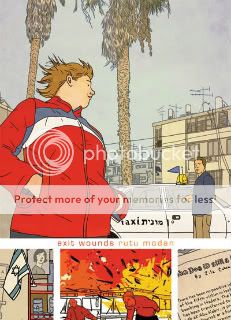Exit Wounds
Rutu Modan, writer/artist
Drawn & Quarterly, 2007
168 pages
$16.95
What a lovely-looking book Exit Wounds is. Rutu Modan’s skillful take on the Clear Line style elicits strong “performances” from her characters, creates an inviting depth of field, and holds her frequently sumptuous colors quite well. Her staging is rarely as dynamic as that cover image, but when it is, hoo boy, fabulous stuff. Overall I feel like she’s doing with the Clear Line what Emmanuel Guibert tried but failed to do in an inkier style: Take real life and gradually subtract detail until what remains is paradoxically even livelier.
The story? Eh. It’s your basic alternative-comics “young person’s personal epiphany enabled by unexpected, brief, intense, difficult relationship with other young person” story, a template established by the likes of I Never Liked You, Black Hole, and Ghost World, gone supernova with Blankets, and since utilized to varying degrees of success by Adrian Tomine, Danica Novgorodoff, Blaise Larmee, Paul Hornschemeier, Dash Shaw, Hope Larson, Bryan Lee O’Malley, the Tamaki sisters cousins, Natsume Ono, Inio Asano, and so on and so forth. This particular variation is uninspired and, literally, unsurprising. When their personalities clashed; when they fell into an uneasy rapport that slowly grew into an easy one; when they argued and made up; when they staved off emotional disaster by having ill-advised sex; when they stormily split up; when they capped off the book with a highly symbolic interpersonal act–each of these elicited a “yep, that’s pretty much what I expected” from me.
The affair is sprinkled with light commentary about Israel’s social, economic, ethnic, and denominational stratification. It’s subtle, thoughtful stuff, focusing on the way that both the state’s inherent construction and its predicament vis a vis its neighbors and occupation-ees constantly juts into people’s personal lives in mostly quiet, mostly unpleasant ways. That and the sumptuous art is probably what got the book over with so many readers and critics. But to me, it’s a little like getting a molten chocolate cake with no molten chocolate inside. It’s not quite a hollow experience, like one of those chocolate Easter bunnies where it’s just a thin layer of yummy and then a lot of air–the cake is substantial and sweet. But without the molten chocolate that a less predictable, more alive story would provide, you still feel like something’s missing.
Tags: comics, comics reviews, Comics Time, reviews


One Response to Comics Time: Exit Wounds